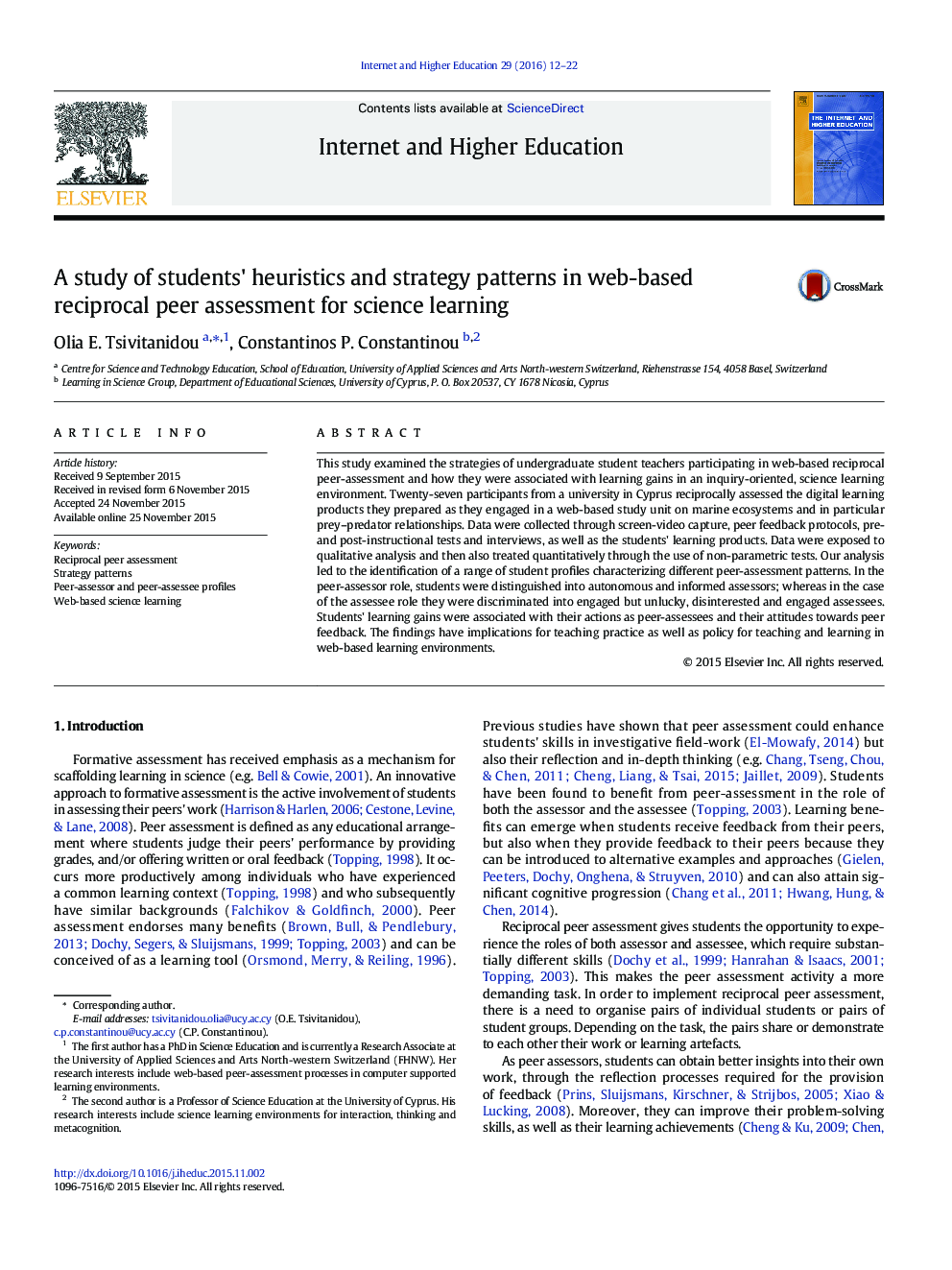| کد مقاله | کد نشریه | سال انتشار | مقاله انگلیسی | نسخه تمام متن |
|---|---|---|---|---|
| 6842003 | 619939 | 2016 | 11 صفحه PDF | دانلود رایگان |
عنوان انگلیسی مقاله ISI
A study of students' heuristics and strategy patterns in web-based reciprocal peer assessment for science learning
ترجمه فارسی عنوان
مطالعهی الگوهای اکتشافی و استراتژی دانشجویی در ارزیابی همبستگی متقابل وب برای یادگیری علمی
دانلود مقاله + سفارش ترجمه
دانلود مقاله ISI انگلیسی
رایگان برای ایرانیان
کلمات کلیدی
ارزیابی همکار متقابل، الگوهای استراتژی، پروفسور نظرسنجی و نظرسنجی، یادگیری علوم مبتنی بر وب،
ترجمه چکیده
در این پژوهش استراتژی های دانشجویان کارآموزی دانشجویان شرکت کننده در ارزیابی همبستگی متقابل وب و نحوه ارتباط آنها با دستاوردهای یادگیری در یک محدوده یادگیری دانش محور، مورد بررسی قرار گرفت. بیست و هفت شرکت کننده از یک دانشگاه در قبرس محصولات یادگیری دیجیتالی که آنها در یک واحد تحقیقاتی مبتنی بر وب بر روی اکوسیستم های دریایی و به ویژه روابط شکارچی شکارچیان مشغول به کار بودند، را بررسی کردند. داده ها از طریق ضبط فیلم برداری تصویری، پروتکل بازخورد همکاران، آزمون های قبل و بعد از آموزش و مصاحبه ها، و همچنین محصولات آموزشی دانش آموزان جمع آوری شد. داده ها در معرض تجزیه و تحلیل کیفی قرار گرفتند و سپس از طریق استفاده از آزمون های غیر پارامتری نیز به صورت کمی اندازه گیری شدند. تجزیه و تحلیل ما منجر به شناسایی طیف وسیعی از پروفایل های دانشجویانی شد که الگوهای مختلف ارزیابی همکار را مشخص می کنند. در نقش هماهنگ کننده، دانش آموزان به ارزیابی مستقل و آگاهانه متمایز شدند؛ در حالی که در مورد نقش ارزیابی شده، آنها را به مشاغل مشغول، اما بی وقفه، بی علاقه و مشغول به تبعیض نژادی تبعیض آمیز. دستاوردهای یادگیری دانش آموزان با اقدامات آنها به عنوان همکاران و نگرش آنها نسبت به بازخورد همکار مرتبط بود. یافته ها به منظور تمرین و همچنین سیاست آموزش و یادگیری در محیط های یادگیری مبتنی بر وب تاثیر می گذارد.
موضوعات مرتبط
علوم انسانی و اجتماعی
علوم اجتماعی
آموزش
چکیده انگلیسی
This study examined the strategies of undergraduate student teachers participating in web-based reciprocal peer-assessment and how they were associated with learning gains in an inquiry-oriented, science learning environment. Twenty-seven participants from a university in Cyprus reciprocally assessed the digital learning products they prepared as they engaged in a web-based study unit on marine ecosystems and in particular prey-predator relationships. Data were collected through screen-video capture, peer feedback protocols, pre- and post-instructional tests and interviews, as well as the students' learning products. Data were exposed to qualitative analysis and then also treated quantitatively through the use of non-parametric tests. Our analysis led to the identification of a range of student profiles characterizing different peer-assessment patterns. In the peer-assessor role, students were distinguished into autonomous and informed assessors; whereas in the case of the assessee role they were discriminated into engaged but unlucky, disinterested and engaged assessees. Students' learning gains were associated with their actions as peer-assessees and their attitudes towards peer feedback. The findings have implications for teaching practice as well as policy for teaching and learning in web-based learning environments.
ناشر
Database: Elsevier - ScienceDirect (ساینس دایرکت)
Journal: The Internet and Higher Education - Volume 29, April 2016, Pages 12-22
Journal: The Internet and Higher Education - Volume 29, April 2016, Pages 12-22
نویسندگان
Olia E. Tsivitanidou, Constantinos P. Constantinou,
